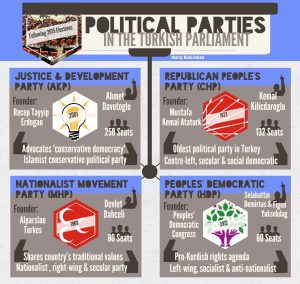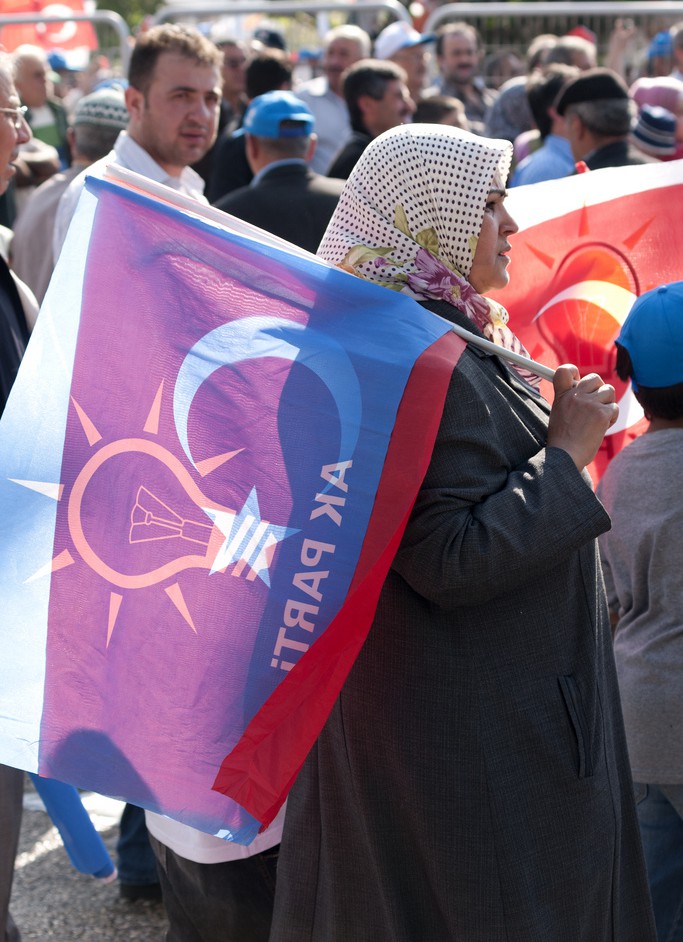By Deniz Torcu
The parliamentary elections on June 7th marked the end of one-party government in Turkey after 13 years. While the Islamist Justice and Development Party (AKP) still managed to come out as the most voted party in the country, receiving 40.8% of the vote and claiming 258 seats in the Parliament, they have lost the absolute majority and, as a direct consequence, the chance to govern on their own, since that would require a minimum of 276 seats in the 500-seat Grand National Assembly.
Meanwhile, the party that came second in the elections was the centre-left Republican People’s Party (CHP), which obtained 25% of the vote and secured 132 seats, followed by the right-wing Nationalist Movement Party (MHP) and the left-wing People’s Democratic Party (HDP), each with 80 seats.
The end of one-party government brings a variety of possibilities and scenarios for Turkey. During the final week of June, the newly-elected members will take their oaths on the first sitting of the Assembly, where Mr. Erdogan, as President of the Republic and head of state, will give the mandate to the leader of the most voted party–Mr. Ahmet Davutoglu of AKP–to form a government.
If Mr. Davutoglu fails to form a coalition government, the mandate will then be given to the leader of the party with the second most votes, Mr. Kemal Kilicdaroglu of CHP. If neither of these parties manages to form a government within 45 days following the official mandate given by the head of state, Mr. Erdogan can call for a new election, which would take place in 90 days. However, while Mr. Erdogan has deemed a repeat election “inevitable“, leaders of all four elected parties voiced their desire to “avoid” such a scenario.
Hence, there is a very critical 45 days for Turkey coming up, when various negotiations are expected to take place among the political leaders in order to form a new government. These are the possible scenarios that we could encounter in the coming days:
- AKP-MHP Coalition Government: The MHP and AKP are the closest parties with regard to their conservative identities and religious ideologies, and as such the MHP could be the first door on which Mr. Davutoglu would knock to form a government. While the MHP leader, Mr. Devlet Bahceli, said that they are open to talks, his condition of re-opening the corruption cases that involve four former ministers and Mr. Erdogan’s son, Bilal Erdogan, could create problems for such a coalition to be formed.
- Opposition Coalition (CHP-MHP-HDP): This is one of the most popular, albeit the least likely, scenario. Although the main opposition leader, Mr. Kilicdaroglu (CHP), recently declared that the 60% of the Turkish people who voted against AKP should be in the government and asked for an opposition coalition, the possibility of uniting the Turkish nationalist MHP and the pro-Kurdish HDP sounds too difficult to achieve, given their clear differences with regard to nationality issues.
- AKP Minority Government: The AKP could also seek the support of individual opposition deputies in order to win a confidence vote in the Parliament, which would allow them to form a minority government. The only party that would possibly have deputies ready to support such a move is MHP. However, the party’s stance against AKP’s amending the Constitution to clear the path for a presidential system and its insistence on re-opening the corruption cases during the previous term would make this difficult to achieve. Moreover, the peace talks that the AKP has been conducting with the Kurdish PKK are unacceptable for everyone in MHP.
- Repeat election: If no coalition can be formed following the 45-day period after the official authorization by the President of the Republic, Mr. Erdogan could call for a new election, which would take place after 90 days.
With scenarios as different as those mentioned above, it is no exaggeration to say that the 7 July elections may be over, however the real challenge for Turkey starts now.


